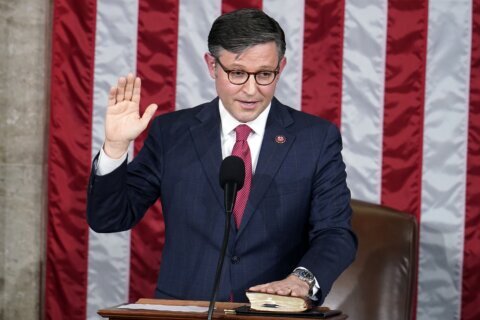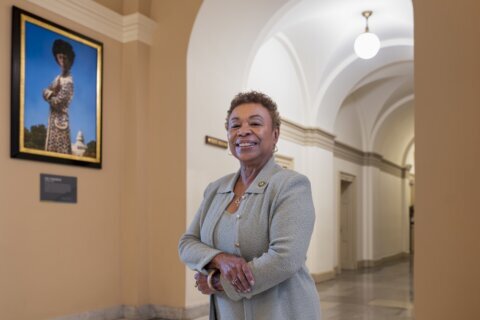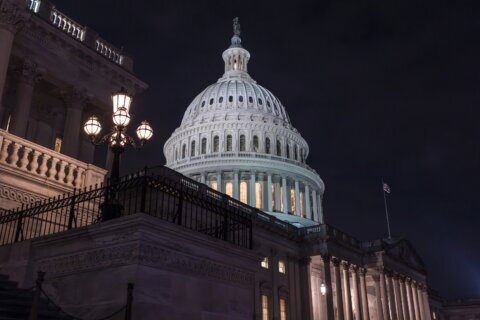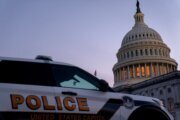WASHINGTON (AP) — Former President Donald Trump is looking to continue his winning streak in Oklahoma as he competes with Democratic Vice President Kamala Harris for the state’s seven electoral votes. Oklahoma voters will also decide races for Congress and the state Legislature, and will consider an effort to amend the state constitution to bar noncitizens from voting.
Oklahoma is one of the most reliably Republican states in the country. The Republican presidential nominee has received at least 65% of the vote there in the last five elections. The state gave Trump his third best victory margin in 2016 and his fourth best in 2020. Trump’s 36-point margin over Hillary Clinton in 2016 was the biggest win in Oklahoma for a Republican presidential candidate since Ronald Reagan beat Walter Mondale in 1984 by 38 points.
Oklahomans haven’t supported a Democratic presidential nominee since President Lyndon Johnson ran 60 years ago. More recently, not only have Democrats been shut out from winning statewide in a presidential election, but no Democratic White House hopeful has won a single county in Oklahoma since 2000, when Al Gore won nine out of 77 counties.
Beyond the presidential race, Oklahoma’s highest profile contest is a ballot measure called “ State Question 833,” which would amend the state constitution to specify that only U.S. citizens can vote there. Eight states will put the question of noncitizen voting bans before voters in November. Noncitizens are already barred from voting in federal elections, and no state allows them to participate in state elections. Washington, D.C., and a handful of municipalities across three states allow noncitizens to vote in local elections, according to the Bipartisan Policy Center. Noncitizen voting is an increasingly popular topic for Republican messaging at the federal and state levels. In July, the GOP-controlled U.S. House passed a measure requiring proof of citizenship for voter registration.
Also in the U.S. House, the state’s five Republican incumbents are all seeking reelection in safe districts.
In the state Legislature, Republicans enjoy lopsided supermajorities in both chambers that are not likely at risk in the November elections. Half of Oklahoma’s 48 state Senate seats and all 101 state House seats are up for election.
The AP does not make projections and will declare a winner only when it has determined there is no scenario that would allow the trailing candidates to close the gap. If a race has not been called, the AP will continue to cover any newsworthy developments, such as candidate concessions or declarations of victory. In doing so, the AP will make clear that it has not yet declared a winner and explain why.
Here’s a look at what to expect in the 2024 election in Oklahoma:
Election Day
Nov. 5.
Poll closing time
8 p.m. ET.
Presidential electoral votes
7 awarded to statewide winner.
Key races and candidates
President: Harris (D) vs. Trump (R) vs. Chase Oliver (Libertarian) vs. Robert F. Kennedy Jr. (independent) and one other.
Ballot measure: State Question 834 (require citizenship to vote).
Other races of interest
U.S. House, state Senate, state House, corporation commissioner and one other ballot measure.
Past presidential results
2020: Trump (R) 65%, Biden (D) 32%, AP race call: Tuesday, Nov. 3, 2020, 8 p.m. ET.
Voter registration and turnout
Registered voters: 2,413,155 (as of Oct. 1, 2024). About 27% Democrats, 52% Republicans and 20% independent.
Voter turnout in 2020 presidential election: 69% of registered voters.
Pre-Election Day voting
Votes cast before Election Day 2020: about 29% of the total vote.
Votes cast before Election Day 2022: about 18% of the total vote.
Votes cast before Election Day 2024: See AP Advance Vote tracker.
How long does vote-counting take?
First votes reported, Nov. 3, 2020: 8:19 p.m. ET.
By midnight ET: about 98% of total votes cast were reported.
___
AP writer Maya Sweedler contributed to this report.
___
Read more about how U.S. elections work at Explaining Election 2024, a series from The Associated Press aimed at helping make sense of the American democracy. The AP receives support from several private foundations to enhance its explanatory coverage of elections and democracy. See more about AP’s democracy initiative here. The AP is solely responsible for all content.
Copyright © 2025 The Associated Press. All rights reserved. This material may not be published, broadcast, written or redistributed.







